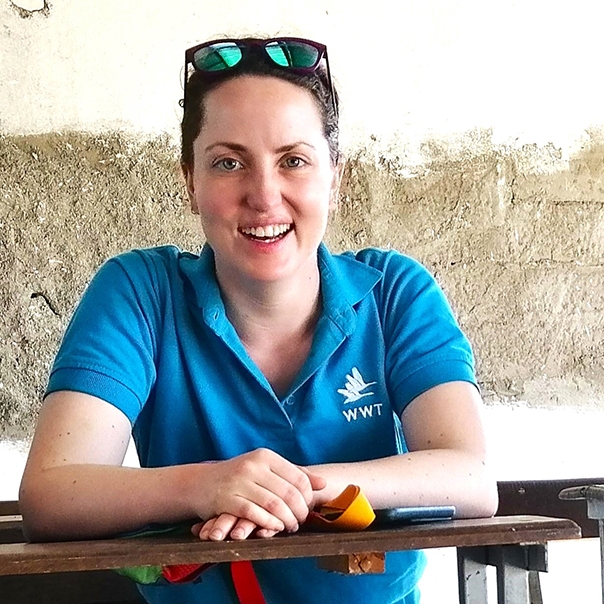Dr Sara Thornton
Principal Research Officer (Ecosystem Health & Social Dimensions)
Honorary Fellow at the University of Leicester

About me
I am a Finlandssvensk researcher who grew up in the Netherlands. From a young age I had a deep affinity with the outdoors and growing up around wetlands and forests set me on the course of studying Ecological Sciences with Honours in Conservation and Ecological Management at the University of Edinburgh. During this time, I joined research teams in the UK, Peru and Indonesia and found a passion for tropical peat-swamp forests as an understudied wetland habitat. I worked as a research assistant, and later a volunteer coordinator with the Borneo Nature Foundation (BNF) in Sebangau peat-swamp forest (Indonesian Borneo).
For my interdisciplinary PhD (with the University of Leicester and BNF) I returned to Sebangau to explore the ecology of peat-swamp fish and the importance of fish and fishing to surrounding peatland communities. My PhD research made practical recommendations for future management actions for peatland restoration and conservation projects, which continue to be implemented by BNF. My postdoctoral research at the University of Leicester built on my PhD, further exploring the challenges that peatland communities (both fish and human) are facing and opportunities for peatland restoration.
My role
I am part of WWT’s Ecosystem Health and Social Dimensions (EHSD) team and as Principal Research Officer I focus on developing novel approaches to wetland research, with a determination to make a significant contribution to the restoration of wetlands globally.
I support WWT’s international projects in Madagascar and Cambodia. I approach wetland restoration in a holistic way: drawing on social science and ecological methods to understand how and why environmental change is happening and how it impacts human and more-than-human beings (in terms of livelihoods, wellbeing and health). I believe it is from this place of understanding motivations and on-the-ground experiences that we can find just and effective approaches to wetland restoration. I take a critical approach to my work; continuously thinking about justice issues, the ethics of various approaches to conservation/restoration and how we can imagine and create a more caring world for human and more-than-human beings alike. This translates into my work supporting the development of our internal practices and policies at WWT including our environmental and social safeguards and research ethics.
My passion for wetlands also manifests in my dedication to science communication and outreach. I have integrated my research into A-level curriculum (and equivalent) appropriate materials, including one book published with the Geographical Association (see publications list below). I have organised and held workshops and exhibitions for a variety of audiences, with a focus on communicating the local and global importance of wetlands. I continue this work with WWT’s Wetland Learning Hub, where I support the design of courses, provide lectures and learning materials, and lead on Monitoring & Evaluation.
Experience and interests
- Fieldwork: I have extensive fieldwork experience in remote and demanding conditions, in both tropical and temperate regions.
- Social science data collection and analysis: including designing, conducting and analysing data from interviews, questionnaires, focus groups and various participatory approaches.
- Ecological data collection and analysis: Notably freshwater fish and water quality, with experience in field surveys of herpetofauna, invertebrates, small mammals and other taxa using a variety of methods.
- Interdisciplinary and cross-cultural work and communication.
- Science outreach to academic and non-academic audiences.
- Project management: including design, planning, implementation and budget management.
- Teaching and supervision: Supervision of undergraduate and postgraduate student projects and teaching.
- Languages: English, Dutch, Bahasa Indonesia
Publications
Thornton, S.A., Cook, S., Cole, L.E.S., Hapsari, K.A., Zawawi, N.Z., Page, S.E. From Muddy Glee to muddy reflections on fieldwork and writing (2022). Area, 54(4): 525-530. .
Thornton, S.A., Setiana, E., Kris yoyo, Page, S.E., Harrison, M.E. & Upton, C. (2020) Towards Biocultural Approaches to Peatland Conservation: The Case for Fish and Livelihoods in Indonesia. Environmental Science & Policy, 114:341-351.
Chapman, R.H. & Thornton, S.A. (Joint first authors) (2020). Top Spec Geography: The Carbon and Water Cycle. Top Spec Geography Series, Geographical Association, UK.
Lees C., Gibson C., Jaafar Z., Ng H.H., Tan H.H., Chua K.W.J., Thornton S.A. & Van Veen F.J.F. (2020) (Eds.) Assessing to Plan: Next steps towards conservation action for threatened freshwater fishes of the Sunda region. IUCN Conservation Planning Specialist Group, Apple Valley, MN, USA.
Thornton, S.A., Cook, S., Astiani, D., Hapsari, K.A., Varkkey, H., Cole, L.E.S., Dargie, G.C., Sjogersten, S., Zawawi, N.Z. & Page, S.E. (2019). ’Pushing the limits’: Experiences of Women in Tropical Peatland Research. Marine and Freshwater Research, Special Issue on Women in Freshwater Science, 71(2):170.
Harrison, M.E., Bramansa Ottay, J., D’Arcy, L.J., Cheyne, S.M., Anderson, K…. Thornton, S.A., Upton, C., Wich, S.A. & van Veen, F. (2019) Forest and Peatland Conservation in Indonesian Borneo: Challenges and Directions. People and Nature, 2(1):4-28.
Thornton, S.A., Dudin, Page, S.E., Upton, C. & Harrison, M.E. (2018). Peatland fish of Sebangau, Borneo: diversity, monitoring and conservation. Mires and Peat, 22(04), 1-25.
PhD Thesis: Thornton, S. A. (2017). (Un)tangling the Net, Tackling the Scales and Learning to Fish: An Interdisciplinary Study in Indonesian Borneo. University of Leicester, Leicester, UK.
See my profile on ResearchGate for my full publication list.
Return to meet the team